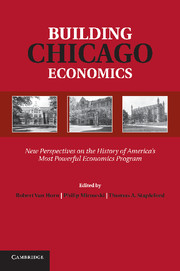 Building Chicago Economics
Building Chicago Economics from Part Four - Debating “Chicago Neoliberalism”
Published online by Cambridge University Press: 05 November 2011
The tracing of influences is the most treacherous ground in the history of thought.
– F.A. Hayek 1979, The Counter-Revolution of Science, 358.Friedrich A. Hayek taught at the University of Chicago from the fall semester of 1950 through 1962, a period during which the second, or new, Chicago School of Economics was formed. The question naturally arises: What was his role in its formation?
A quick look at the historical record, and common sense itself, suggests that it must have been close to nil. Milton Friedman, whom many would consider the central figure in the School, was hired in 1946, before Hayek had arrived. Hayek tried to get a job in the economics department in 1948, but they declined to make him an offer. He ended up instead on the Committee on Social Thought. During his time at Chicago (1950–1962) Hayek worked principally on political philosophy rather than economics, with The Constitution of Liberty (1960) being the end result. And Hayek famously disagreed with the leader of the Chicago School, Milton Friedman, on monetary theory and methodology, two of the defining aspects of Friedman’s legacy.
To save this book to your Kindle, first ensure [email protected] is added to your Approved Personal Document E-mail List under your Personal Document Settings on the Manage Your Content and Devices page of your Amazon account. Then enter the ‘name’ part of your Kindle email address below. Find out more about saving to your Kindle.
Note you can select to save to either the @free.kindle.com or @kindle.com variations. ‘@free.kindle.com’ emails are free but can only be saved to your device when it is connected to wi-fi. ‘@kindle.com’ emails can be delivered even when you are not connected to wi-fi, but note that service fees apply.
Find out more about the Kindle Personal Document Service.
To save content items to your account, please confirm that you agree to abide by our usage policies. If this is the first time you use this feature, you will be asked to authorise Cambridge Core to connect with your account. Find out more about saving content to Dropbox.
To save content items to your account, please confirm that you agree to abide by our usage policies. If this is the first time you use this feature, you will be asked to authorise Cambridge Core to connect with your account. Find out more about saving content to Google Drive.